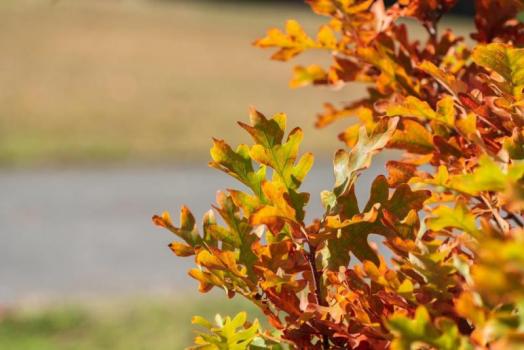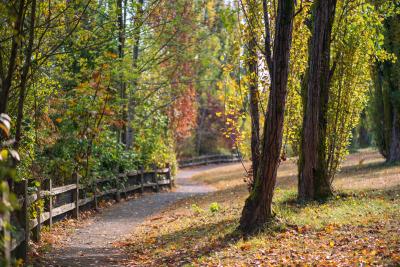Urban Forestry and Trees
The Benefits of Trees
Abundant tree canopy is an essential part of Mercer Island’s character and vital to community well-being, health, resiliency, and sustainability. With 48% canopy cover, Mercer Island is one of the most forested communities in our region. Trees provide numerous environmental, social, and economic benefits, which are commonly referred to as “ecosystem services.” Some examples of these services include:
- Decrease in urban heat island effect and reduce building cooling costs
- Reduction of air and water pollution
- Sequestration of carbon dioxide
- Increase in stormwater infiltration and retention, resulting in reduced erosion
- Increase in property values
- Provide wildlife habitat
- Positive impacts on mental and physical health
In recent extreme heat events, trees have proved to be very effective at cooling the air. During the July 2021 heat dome event, certain areas in both Portland and Seattle were registering up to 20° F cooler than the hottest areas in each respective city. The coolest areas had one thing in common: forested natural areas.
While the many benefits of urban trees are becoming better understood all the time, there is something compelling and intangible about the beauty of trees that may never be quantified.
Understanding our Trees
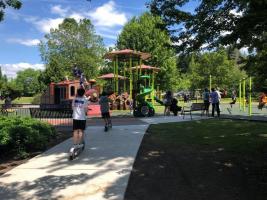 The first step in managing our urban forest is understanding what we have; this can be accomplished via several tools. One such tool is a tree inventory, which provides tree species, size, and health data. With this data in hand, staff are able to take measures to improve the management of the trees, including reducing tree/sidewalk conflicts, replacing dead trees, increasing tree species diversity, and planning for ongoing maintenance. In 2018, the City of Mercer Island completed an inventory of street trees in Town Center. The inventory revealed just five species of trees make up 93% of the 803 trees within Town Center. This type of data helps planners diversify future tree plantings, ultimately creating a more resilient canopy.
The first step in managing our urban forest is understanding what we have; this can be accomplished via several tools. One such tool is a tree inventory, which provides tree species, size, and health data. With this data in hand, staff are able to take measures to improve the management of the trees, including reducing tree/sidewalk conflicts, replacing dead trees, increasing tree species diversity, and planning for ongoing maintenance. In 2018, the City of Mercer Island completed an inventory of street trees in Town Center. The inventory revealed just five species of trees make up 93% of the 803 trees within Town Center. This type of data helps planners diversify future tree plantings, ultimately creating a more resilient canopy.
Also in 2018, the City of Mercer Island commissioned an urban tree canopy analysis. The analysis demonstrated that the total tree canopy cover on the island increased 8% between 2007 and 2017, from 40% to 48%. The study gave the City a greater understanding of the distribution of trees on Mercer Island, how tree canopy has changed over time, and identified areas suitable for tree planting. While City parks and rights-of-way (ROW) have some space for additional trees, the vast majority of plantable land (85%) on the island is located on single-family residential parcels. Planting additional trees on these lands would contribute significantly to maintaining, or even increasing, the City’s tree canopy cover. Increasing tree canopy on private property is also a 2023 Climate Action Plan (CAP) strategy.
Challenges
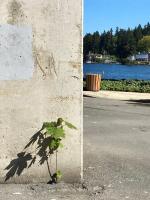 Trees in urban environments face significant challenges not only to their survival but thriving throughout their lifespan. They must endure harsh urban conditions, including exposure to air and waterborne pollutants, heat radiating from the pavement, and limited space for root growth. These conditions render them more susceptible to diseases and insect damage. Climate change and summer drought are also affecting tree health, which makes it easier for invasive and native species of insects, animals, plants, and diseases to attack individual trees and even damage entire landscapes. It is rarely one factor that kills a tree, but a combination of compounding issues.
Trees in urban environments face significant challenges not only to their survival but thriving throughout their lifespan. They must endure harsh urban conditions, including exposure to air and waterborne pollutants, heat radiating from the pavement, and limited space for root growth. These conditions render them more susceptible to diseases and insect damage. Climate change and summer drought are also affecting tree health, which makes it easier for invasive and native species of insects, animals, plants, and diseases to attack individual trees and even damage entire landscapes. It is rarely one factor that kills a tree, but a combination of compounding issues.
In the face of these challenges, active management provides the best chance to preserve, maintain, and enhance the urban forest.
Community Involvement
Urban forests thrive when the community understands, values, and actively engages with the urban forest. To maintain the high level of tree canopy on Mercer Island, it is crucial to both preserve existing trees and replant those lost due to storms, development, or mortality. While the City is dedicated to stewarding trees on public properties, the most recent tree canopy assessment showed that private landowners also contribute significantly to the Island’s tree canopy: 76% of total urban forest canopy on Mercer Island is found in single-family residential areas! The assessment also showed that 85% of Mercer Island’s plantable area for new trees is located on private land. By planting and caring for trees on their properties, residents become vital participants in the effort to maintain and increase the tree canopy cover of Mercer Island. Here’s how you can contribute:
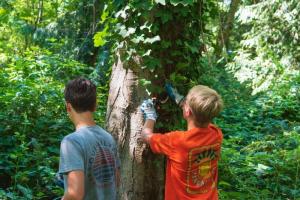 Maintain your trees’ health
Maintain your trees’ health- Plant trees!
- Use proper pruning techniques and hire International Society of Arboriculture certified arborists to perform maintenance on your trees
- Don’t top trees
- Avoid removing trees unless absolutely necessary
- If you need to remove a tree, apply for a permit and follow replacement requirements
- Ensure newly planted trees have the best shot at survival by watering immediately after planting and often during the dry season
- Identify invasive and noxious species on your property and learn best practices to manage them
- Volunteer at a City-run event
City Efforts
Investing in the urban forest is a benefit multiplier – these trees provide a wide variety of services! Mercer Island has prioritized the preservation and enhancement of tree canopy by allocating funds for ecological restoration in our open spaces and urban forest.
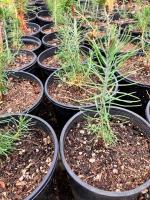 The urban forestry program manages landscape and street trees in the Right-of-Way (ROW) and public properties. The City’s urban forestry program work includes:
The urban forestry program manages landscape and street trees in the Right-of-Way (ROW) and public properties. The City’s urban forestry program work includes:
- Responding to requests about trees
- Inspections and evaluations
- Right-of-way tree permit review
- Public outreach and education
- Tree pruning for safety, traffic sightlines, or tree health
- Removal of dead, diseased, or dying trees
- Replanting trees in parks, Town Center, and street rights-of-way
- Tree disease and pest management
Additionally, the city engages in restoring native tree canopy in our parks and open spaces. To learn more about our forest restoration efforts and volunteer programs supporting restoration and other initiatives, please visit the following pages:
In 2023, the City of Mercer Island finalized a Climate Action Plan (CAP) aimed at providing guidance for government, businesses, and households to reduce the community's greenhouse gas (GHG) emissions and protect the environment. The CAP acknowledges the crucial role of natural systems in shaping the local climate. Increasing the urban tree canopy and enhancing green spaces emerged as strategies of the plan. The CAP sets action items to enhance tree cover on private land by 5% by 2030 and 15% by 2050. According to the CAP, trees lost on city properties are to be replaced at a ratio of 5:1 and all new City plantings are to be climate-adapted species. This approach aims to promote a more sustainable and resilient environment for the island community.
Please note that the City does not provide general tree consulting services. For a detailed assessment of the condition or quality of trees on their private property, residents are advised to contact a certified arborist. The International Society of Arboriculture offers a Find an Arborist Tool and other resources.
If you have an issue with a city tree, please use our service request site to submit a detailed report.
If you encounter an issue with trees interfering with power lines, please contact Puget Sound Energy directly. The City of Mercer Island does not maintain power or communication lines. Maintenance of the power line from the main powerline to the home is the responsibility of the homeowner. PSE reminds us to treat all downed lines as if they are energized with electricity.
Occasionally, City staff or contractors must remove trees on City property due to unacceptable risk, conflicts with existing infrastructure, or redevelopment. Whenever possible, efforts are made to retain trees. Mercer Island’s City code requires that removed trees are replaced at a minimum ratio of 2:1. On average, the replacement ratio is much higher.
Need to Prune or Remove a Tree?
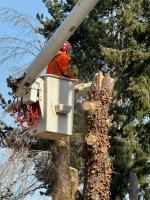 In most cases, obtaining a permit from the city is necessary for tree removal. The permit review process ensures that trees are not unnecessarily cut down and that appropriate replacements are planted.
In most cases, obtaining a permit from the city is necessary for tree removal. The permit review process ensures that trees are not unnecessarily cut down and that appropriate replacements are planted.
Our Community Planning and Development department handles the review of tree work permits. You can learn more at our City Arborist page. View the city code that applies to tree removal and pruning here.
Tree City USA
In 2018, Mercer Island joined over 3,400 communities across America in earning the designation of Tree City USA. This achievement is granted to communities that meet four core standards of sound urban forestry management: maintaining a tree board or department, having a community tree ordinance, allocating a minimum of $2 per capita on urban forestry, and celebrating Arbor Day. Obtaining this distinction not only recognizes the many ways the City of Mercer Island supports trees and urban forestry but also makes the City eligible for new grant opportunities to support on-the-ground forest restoration work and policy development.
Each October, we celebrate Arbor Day with family-friendly volunteer activities in one of our beautiful parks. Kick off the fall planting season and enjoy a wonderful day of building community and enhancing urban forest habitat. Keep an eye on our Volunteer Opportunities to sign up for Arbor Day.
